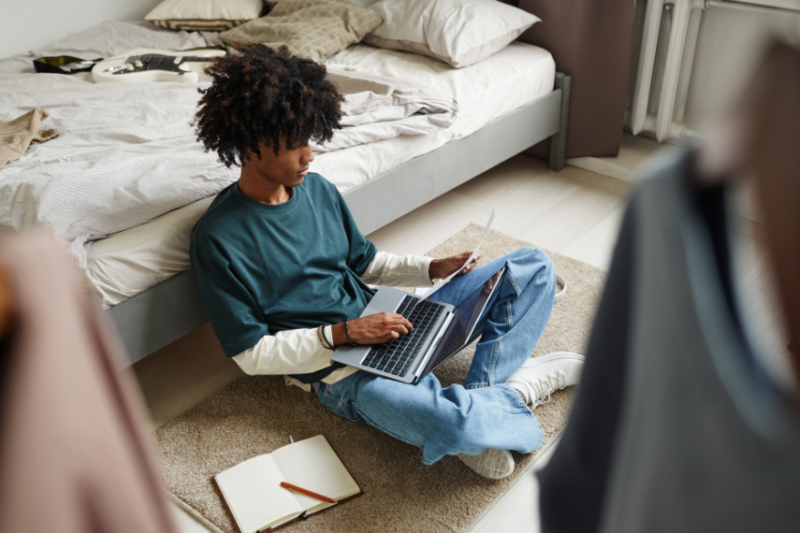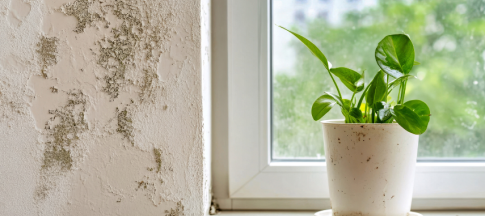
If you’ve ever rented, you know it can be tough getting your security deposit back. This can be a big deal, especially as a student when money’s tight!
If you’re looking to get your deposit back, we’ve got the perfect guide for you.
Read on to learn how to get your student rental in good shape before you move out.
Before moving into your student house
If you haven’t moved into your student home yet and are keen to keep your deposit on the other side, we’ve got some useful tips to keep in mind.
Take photos
Before unpacking anything and jazzing up your space, take photos of all the rooms in the house.
The most important thing to take photos of is any damage that’s already there, like:
- scuffed walls
- broken appliances
- damaged carpets
- damaged furniture
- broken door hinges
This will prove that there was damage before you moved in, so your deposit doesn’t end up paying for it.
Test the appliances
Test all the appliances that are there before you move in, like:
- ovens
- fridges
- freezers
- TVs
- radiators
- showers
- toilets
If there are any issues, tell your landlord straight away.
Ask for an inventory
Ask your landlord for an inventory of the house so you know what’s there beforehand.
This cuts the chances of you being accused of stealing anything after your tenancy ends, if it wasn’t there in the first place.
Read your tenant agreement (thoroughly!)
Tenancy agreements are long and, let’s be honest, a bit boring. But it’s this document that lists your rights, plus any dos and don’ts as a tenant living in that property.
You might notice things you weren’t aware of, or things you want to chat to your landlord about.
Use a tenancy deposit scheme
Your landlord is legally required to sign you up to the Tenancy Deposit Scheme so your deposit isn’t unfairly taken from you. The Deposit Protection Scheme also works in the same way.
Ask your letting agent or landlord if your tenancy agreement includes deposit protection. If it doesn’t, don’t sign anything until your landlord has sorted it.
Find out more about deposit protection.
After moving into your student house
Once you’ve moved into your student house, there are some more things to tick off your list before settling in.
Clean the house
Clean the house as a group with your housemates before settling in. This includes:
- throwing out any rubbish
- mopping or hoovering the floors
- cleaning the counter tops
- unblocking drains and sinkholes
- cleaning the bathroom
You can split the jobs between the group so everyone has their own task. You could even have a celebratory treat (or pub run) once you’re all done!
Run through the inventory
Get together and run through the initial house inventory as a group. Make sure you’ve got everything listed and you’ve labelled any items that are damaged.
Record final meter readings from previous tenants
Don’t forget to log those final meter readings from utilities used by the past tenants. This includes from the electricity, gas and water meters.
If you don’t know where they are, ask your landlord. Take a photo and write them down so you’ve got extra evidence.
Know your rights
It’s super important to know what your rights are as a tenant. It’s easy to assume your landlord is the one in the driver’s seat, but there are rules they have to follow too.
These include:
- telling you if they’re coming over at least 24 hours beforehand
- making sure the heating and water is working
- not looking in any wardrobes or drawers without asking you first
- making sure the house is safe to live in
- not unfairly increasing your rent
Check out our guide on the Renters’ Right bill, too – it's created by the government and is there to protect you!
Know your responsibilities
Knowing what you’re responsible for is just as important as knowing your rights! Some things are up to you to sort when you’re renting a property, like:
- Paying your rent on time – if you think you’re going to be late paying the rent, you need to tell your landlord to see if that’s okay.
- Paying any other costs that come down to you – like your electricity or water bill, if they’re not already included in the rent.
- Keeping the property in good shape – that includes keeping it clean, bleeding radiators, locking doors, etc.
- Paying to fix any damage caused by you, your friends or family – tell your landlord straight away if this happens.
Head to GOV.UK to learn more about your rights and responsibilities as a tenant.
While living in your student house
It’s important to keep things in good shape while you’re living in your student house.
This includes:
- cleaning regularly – this includes hoovering, wiping counters and emptying bins
- keeping doors locked and windows closed when you’re not home
- reporting any issues or damage to your landlord straight away
- paying your rent on time
- putting the rubbish out regularly – don't let bags build up in the garden!
When it comes to decorating, avoid using anything that can damage the wall, like nails, glue or Sellotape.
You should chat with your landlord about using things like incense and candles if it’s not in your tenancy agreement. The same goes for keeping pets in your rental property.
Before moving out of your student house
So it’s time to move out your house, whether you’re moving onto the next one or saying goodbye to uni for good!
Make sure your student house is in good condition before you head off – especially if you want that deposit back.
You can do this by:
- taking a final inventory before leaving – the same way you did when moving in
- taking pictures of any damage that happened while living there
- doing a big house clean as a group – top to bottom!
- taking the final meter readings – with photos
- getting rid of any rubbish – inside and outside
What can my landlord use my deposit for?
Your landlord can use all or part of your deposit to fix damage you caused while renting their property.
Common reasons for using a tenancy deposit include:
- repainting damaged walls
- replacing damaged carpet
- cleaning the property if it’s left dirty
- removing rubbish left behind
- taking any unpaid rent
If your landlord wants to take or reduce the deposit you get back, you’re allowed to ask them what they want it for.
They should also give evidence for any damage they think you should pay for.
Getting your deposit back
If it all goes well, your landlord or letting agent should send you your deposit back. Nowadays, they’ll probably do it via bank transfer.
If they want to use some or all of your deposit, they or the letting agent need to let you know.
You can ask for evidence of damage, mess or issues if you don’t think your deposit should be taken.
How do I appeal getting my deposit back?
It’s always best to try and chat to your landlord or letting agent first before taking things further. Sometimes things come down to simple misunderstandings!
If this doesn't work and you think your landlord is in the wrong, you can raise a dispute with TDS.


